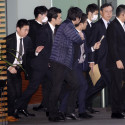From prime minister to ordinary people, Japanese responded with shock Sunday at a video purportedly showing one of two Japanese hostages of the extremist Islamic State group had been killed.
With national attention focusing on efforts to save the other hostage, 47-year-old journalist Kenji Goto, some also criticized Prime Minister Shinzo Abe’s drive for a more assertive Japan as responsible for the hostage crisis.
A somber Abe appeared on Japanese public broadcaster NHK early Sunday demanding the militants release Goto unharmed. He said that the latest video was likely authentic, although he added that the government was still reviewing it. He offered condolences to the family and friends of Haruna Yukawa, a 42-year-old adventurer taken hostage in Syria last year.
Abe declined to comment on the message in the video, which demanded a prisoner exchange for Goto. He said only that the government was still working on the situation, and reiterated that Japan condemns terrorism.
“I am left speechless,” he said. “We strongly and totally criticize such acts.”
Yukawa’s father, Shoichi, told reporters he hoped “deep in his heart” that the news of his son’s killing was not true.
“If I am ever reunited with him, I just want to give him a big hug,” he said.
President Barack Obama condemned what he called “the brutal murder” of Yukawa and later Sunday offered condolences to Abe after arriving in India. Obama’s statement didn’t say how the U.S. knew Yukawa was dead.
He said that the United States will stand “shoulder to shoulder” with Japan, and also called for the immediate release of the second hostage.
The Associated Press could not verify the contents of the video message, which varied greatly from previous videos released by the Islamic State group, which now holds a third of both Syria and Iraq.
Patrick Ventrell, a spokesman for the White House National Security Council, said U.S. intelligence officials were also working to confirm whether it was authentic.
Criticism of Abe has touched on his push for an expanded role for Japan’s troops — one that has remained strictly confined to self-defense under the pacifist constitution written after the nation’s defeat in World War II.
The threat from the Islamic State group coincided with Abe’s trip to the Middle East, where he announced $200 million in humanitarian aid to the nations fighting the militants.
Reflecting widely held sentiments here, Jun Hori, an independent journalist, bemoaned Abe’s directly mentioning the Islamic State in announcing the aid.
The Islamic State addressed Abe and cited that same figure as ransom demand in its video Tuesday that threatened to behead Yukawa and Goto within 72 hours.
“I feel Abe’s misguided shallow acts have trigged this ransom demand,” said Toshiko Okada, a former English school administrator, who has been stunned by the news and praying for the hostages’ lives. “Maybe he should be attending to problems at home.”
Hori believes Japan, restricted by its constitution, has held a slightly different position from the U.S. and Europe on the Middle East, and had up to now fared better at avoiding Western-style terrorist attacks.
“Japan has its own path of peaceful diplomacy that it should take,” Hori said.
Abe reiterated Sunday his earlier comments that the government of Japan will not succumb to terrorism and will continue to cooperate with the international community in the fight against it.
He spoke by phone with Jordanian King Abdullah II on Saturday, Japanese officials said, without elaborating on what they discussed. He also called the two hostages’ families.
Goto’s mother, Junko Ishido, was skeptical about the voice on the video claiming to be her son’s.
“I’m petrified,” Ishido told NHK. “He has children. I’m praying he will return soon, and that’s all I want.”
Japanese government spokesman Yoshihide Suga said the audio was still being studied, but there was no reason to deny the authenticity of the video.
Yukawa was captured last summer, and Goto is thought to have been seized in late October after going to Syria to try to rescue Yukawa.
Kent Calder, director of the Reischauer Center for East Asian Studies at SAIS/Johns Hopkins University in Washington D.C., said the “communalistic” and conformist aspects of Japanese society makes events like the hostage crisis played up in the mainstream media and is particularly emotionally disturbing for its people.
“That trauma is compounded by the fact that I don’t think most Japanese saw this coming,” he said in an email. “Many will realize out of this that they too are a part of global society, rather than an isolated island nation.”

